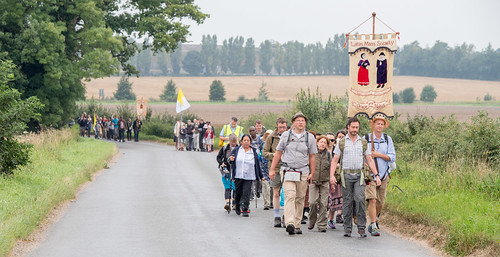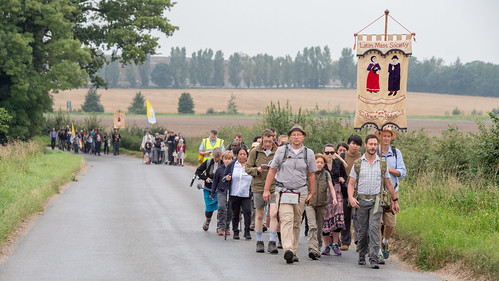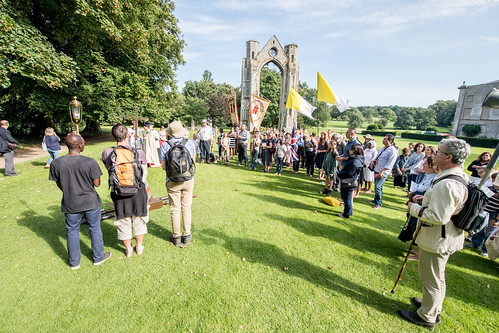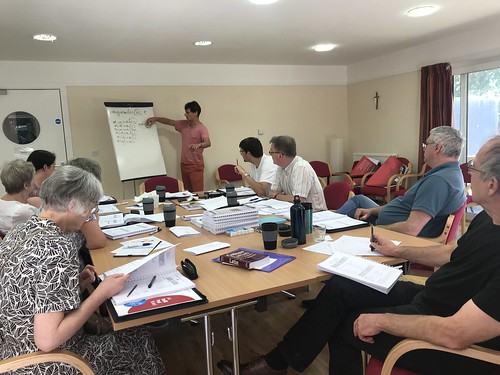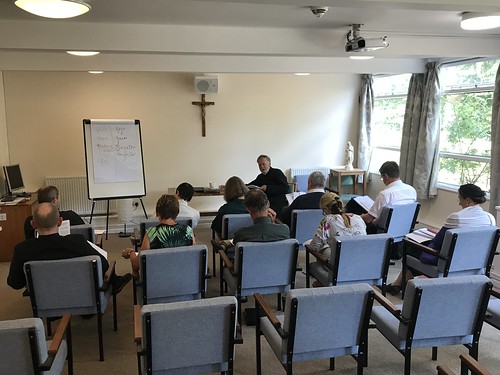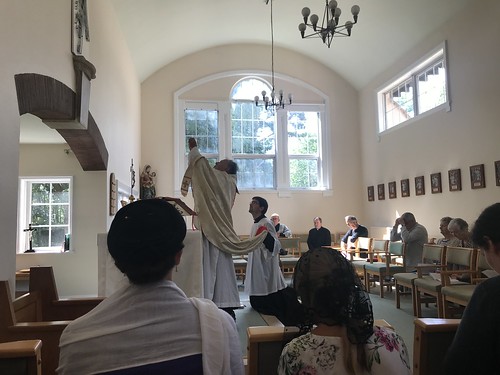Chairman's Blog
Viganò and the pyramid of lies
The Viganò story broke on the morning of the third day of the Latin Mass Society's Walking Pilgrimage to Walsingham. I started seeing it on social media at a rest-stop about 5 miles from the shrine, as I was tweeting our progress. So I come a little late to the party, and would much rather be writing about other, and more edifying, matters. But here are some thoughts, now I have got home.
Catholics, indeed everyone interested in the Church, stand in dazed awe at an audacious pyramid of lies. Broader, comprehensive lies support detailed, lesser lies, in a intricate pattern, soaring to vast heights and covering an extensive territory, something like the fortress of Sauron, in Tolkien's Lord of the Rings: wall upon wall, battlement upon battlement, black, immeasurably strong, mountain of iron, gate of steel, tower of adamant.
A small but indefatigible cadre of Catholic commentators (Austen Ivereigh, Massimo Faggioli et al.) are suggesting to us that this fortress of falsehood is to be found in Viganò's own 'testimony'. They see a pattern of deceit, motivated by frustrated ambition, and no doubt other unworthy things, being supported by a 'team' including various persons they do not like. If this were the case, the situation would be extremely worrying. This interpretation recruits as Viganò's co-conspirators prelates of far greater dignity and popularity than Archbishop Viganò himself. It is impossible to think of a public challenge to a Pope's authority as elaborately planned or supported by such senior churchmen in modern times, and coming on top of the McCarrick case and the Grand Jury report, the implications are dizzying. One could only say that, on this view, one statement at least of Viganò's memorandum is true: that the cracks perceived by Pope Paul VI as letting the smoke of Satan into the Church have become chasms.
We are facing a real crisis - on this view - not just of this Papacy, but of the Church. The Church's credibility is at hazard.
There is only one possible response, only one way of retrieving the situation. The claims must be shown to be false by a truly credible investigation. A major part of this investigation should not, fortunately, be too difficult, because Viganò himself notes that a lot of very senior Cardinals would inevitably have had access to the information he claims to be revealing. Getting them to testify under oath to affirm what they did or did not know would go a long way to resolving the issue. Publishing the relevant portions of various files in Washington and Rome would do a great deal more. In these two ways there would be some hope that the story could be brought to heel, in public relations terms, in a couple of weeks.
Austen Ivereigh is a public relations expert, but the curious thing is that he is not calling for an official investigation of any kind. He thinks that the Viganò memo would best be dealt with by ordinary journalistic means. Since there are already journalists supporting the veracity of the memo, however, this will inevitably mean a protracted and inconclusive conflict. It is even more strange that the focus of Ivereigh's attention has been not on identifying ways of demonstrating the falsehood of specific allegations, but on attempts to villify Viganò himself. Viganò has had to publish letters showing the falsehood of claims now being made that he tried to bring a particular abuse investigation to a halt. This kind of skirmish is an absurd distraction. Catholics paying attention to this escalating crisis do not care about the alleged misdeeds of Archbishop Viganò. They care about the alleged misdeeds of Cardinals and of Pope Francis himself. Those are the ones which need to be looked into and quashed: if they can be.
Pope Francis himself has weighed in on the allegations in a different, but equally puzzling way. In a press conference, he told the assembled journalists to read the memorandum and reach their own conclusions. His advisers may have imagined that this response would make the Pope look statesmanlike and confident, brushing off absurd accusations as beneath his notice. But these are not anonymous denunciations on a blog or scandal-sheet. Viganò has held some of the most senior positions in the Curia, and was intimately connected with the matters he talks about when he was Nuncio to the United States. He has now been supported by a senior Vatican diplomat he worked with in Washington, and American bishops are beginning to call for a public investigation. If Pope Francis wants to be free of these claims, he needs at least to go to the trouble of denying them. Then he should ask one of his official staff to furnish the documentary and testamentary evidence needed to disprove them.
Prelates and Popes have been accused of wrongdoing before, as have many heads of state and heads of government around the world. If the accusations are at all credible, and yet false, the sensible ones go to the necessary trouble of disproving them, using the abundant resources of personnel and documentation at their disposal. The ones who do not do this, leaving their hapless supporters to defend them without the weapons to do so effectively, do a disservice to the community which they have been called to govern.
So much, then, for the case for the defence. The Pope wants us to make up our own minds about Viganò's memo, and it is indeed difficult not to take a view. What are we to say to non-Catholics about it? What should we say to secular commentators and secular authorities? Should we be defending the Church's right to deal with this matter internally, when there is every indication that no such a thing will happen? Should we be saying that Pope Francis, and others standing accused of wrongdoing in the memo, must be given the benefit of the doubt, when they have not even denied the accusations? The world is looking to see if Catholics, ordinary Catholics, Bishops and Cardinals, and every kind of Catholic commentator and leader, are going to demand action over what appear to be serious and credible accusations, or if they are going to pretend everything is all right while the Church's moral authority is being systematically dynamited and bulldozed around them.
So here is what I, personally, say. I do not imagine that I am infallible, and nor I do not have access to any very special information, but for what it is worth my judgement, after reading the Viganò memo, is that is not just credible, but that it is, at least in broad outline, obviously true. Yes, it is obviously true.
Deny it who can: by 2013, they must have had a considerable collection of such letters in Rome, not just from the wretched ordinary victims but from senior priests and bishops. If they didn't know about the court cases leading to pay-offs to victims, it was only because they did not want to know. When Viganò says that, as Nuncio, he knew, he is simply stating the obvious. People would have been queueing up to tell him. When Viganò says that he was in touch with his superiors in Rome about it, the only rational response is say: well, of course he was. What possible motive would a Nuncio have to sit on a powder-keg like that without telling his superiors?
The next key claim of Viganò is that having been told to cease his public ministry by Pope Benedict, McCarrick resumed travelling, speaking and so on under Pope Francis, who made use of him as a trusted adviser. Of this one can say: it would be incredible, it would simply not cohere with publicly known facts, if this were not true. As Cardinal and Pope, Ratzinger tried hard to rein in abusers, but he drew back from public actions which would cause grave scandal. Thus, as Pope he finally managed to cashier the monster Maciel, but did not grasp the nettle and suppress his foundation, the Legionnaires of Christ. Against considerable opposition, Pope Benedict appointed a clean bishop to the tainted see of Brussels, to succeed Cardinal Daneels, but did not intervene further in the Belgian church, or punish Daneels, leaving his appointee, Leonard, isolated and ineffective. He accepted the resignations of four Irish bishops accused of abuse, but failed to use the psychological moment to clear out the hierarchy more fully. Pope Benedict's papacy was, truly, painful to watch. The claim that Pope Benedict quietly told McCarrick, who had already lost his vote in any future conclave due to age, to live a life of penance and prayer must be true, because Benedict must have known about the problem, and we know that nothing more public happened to McCarrick at that time. That Pope Francis equally quietly brought him back into circulation as an adviser, and given little jobs to do, is equally obvious, because McCarrick did indeed come back into circulation, and Pope Francis is the only person who could have made that happen.
And just as the actions attributed to Pope Benedict are characteristic of him, so in this Pope Francis did what we already knew he did with others, such as Cardinal Daneels. An abuse victim actually made a recording of Daneels trying to hush up an abuse case and save the reputation of one of his colleagues, and this contributed to a major public row in Belgium involving the police and courts. Don't take my word for it, here it is from the BBC from 2010. Are we going to be told that Pope Francis just didn't know about this case? Because Pope Francis had Daneels next to him on the balcony when his papal election was announced just three years later.
A third major accusation of Viganò is that a number of American bishops and Curial prelates, whom he names, were well aware of the McCarrick problem, and those American bishops who have denied this must be lying. Once again, while they have as much a right to their good name as any in the Church, it is simply not possible to see how what Viganò says could be false. Of course they knew. Of course they knew. How could they possibly not have known? Do they have some preternatural gift of not hearing, or of forgetting, explosive accusations involving their senior colleagues? It would be one thing for them to say that they had heard things and not believed them. But we are being asked to believe, for example by Cardinal Farrell who worked as an auxiliary bishop under McCarrick for six years, and Cardinal Wuerl, who succeeded McCarrick as Archbishop of Washington, that they never even heard about it. I'm sorry, Your Eminences: in asking us to believe that, you ask too much.
To say that we could already have worked out these things for ourselves is not to say that Archbishop Viganò's testimony is not significant. By placing a number of facts together, through the perspective of a man well-known in the American church at the very nexus between American bishops and the policies of Pope Benedict and Pope Francis, Viganò has made inescapable certain conclusions, and we see now more and more Catholic commentators giving up the struggle to defend Pope Francis' record on the abuse issue. Michael Voris' Church Militant site, which once routinely condemned all criticisms of any Pope, has now come out in favour of Viganò. This tweet from Taylor Marshall speaks for itself.
Meanwhile, apart from the hard-core 'team Francis' members, Catholic commentators accustomed to defend Pope Francis against those they imagined were extremists, have found nothing to say. Of far greater significance, however, is the silence of the world's Cardinals and Bishops: other than those, of course, who are saying that there should be a proper investigation (such as Cardinal Burke).
If Viganò's testimony is not an extraordinary, demonic edifice of lies, then, we are forced to conclude that this dark fortress lies elsewhere, and that it's open revelation and final destruction may be nigh. The smiling faces and reassuring speeches of senior prelates and even of the Holy Father have been concealing some ugly things for a long time. We are already hearing about those ugly things from the secular press and the secular courts, and it is of the highest importance that matters are not left entirely to them, unless we want the Church to be reshaped by them alone. We must raise our voices now if we are going to retain any credibility. We must make clear our outrage and our refusal to be fobbed off with excuses and window-dressing reforms. The Church's evangelising potential in the next generation will be crucially shaped by the reaction of Catholics today to these scandals. We risk otherwise the condemnation of the Angel in the Apocalypse:
Scio opera tua, quia nomen habes quod vivas, et mortuus es.
I know thy works, and that thou hast the name of being alive. And thou art dead. (Rev 3:1)
Follow the LMS Walsingham Pilgrimage
Blogging this week has been pushed aside by preparations for the LMS Walsingham Pilgrimage.
Within the limits imposed by the limited mobile phone coverage in East Anglia, and limited time for fiddling about with phones, I will try to provide updates using Twitter: follow me on
@lmschairman
I will also provide updates, with a bit of luck, on Strava. This is an exercise app. which allows users to upload routes and times of walks (/runs etc.) recorded as they are done. I plan to upload each leg of each day's walk at the stops. We'll see how well this works!
Please say a prayer for the pilgrimage. We have about 65 pilgrims this year, slightly more than last year.
Support the work of the LMS by becoming an 'Anniversary Supporter'.
There must be episcopal resignations
On CNA, JD Flynn writes:
A third thing that could derail serious ecclesial reform has to do with the call for episcopal resignations. Wuerl, in particular, has been the subject of ongoing calls for resignation, along with other bishops. While the Holy See might judge those moves to be justified, they could have the unintended effect of stalling more systematic and cultural change, if they are not managed carefully. If individual bishops resign, and are then cast as the cause of the problems, the pressure for broader reforms could deflate. The Vatican must ensure that if it accepts the resignation of some bishops, the remaining members of the episcopate remain under pressure to enact the reform efforts the USCCB has said it would like to facilitate.
Suppose a commercial company, charity, or political party had a crisis over sexual abuse. It’s not an extravagant supposition. Would Mr Flynn tell us that the leadership who had sustained the culture which enabled the abuse should be left in place lest, with their departure and the appointment of new leaders with the brief to sort the problem out, pressure against the institution would ‘deflate’?
Again, suppose a Catholic diocese had financial problems, which threatened the solvency of the diocese. Again, this is easy to imagine. Often, in such cases, if not high-profile resignations, ways are found to move the key people on, if they aren’t due to retire anyway. Bishops are ‘ill’. Coadjutor bishops are appointed. People are found new jobs elsewhere. Competent substitutes are parachuted in. Would Mr Flynn deplore this? Would he say: no, this will ‘deflate’ pressure for reform. Bishops of proven incompetence, with a vested interest in not looking deeply into problems, are the ones who should be clearing up the mess they helped to create, and sustained, perhaps, for decades.
I don’t think he would say that.
To say that they are psychologically ill-equipped to carry out a root-and-branch reform would be something of an understatement. There will be no change of culture while these men dominate the episcopate.
Support the work of the LMS by becoming an 'Anniversary Supporter'.
'Look not upon me': thoughts on the abuse crisis
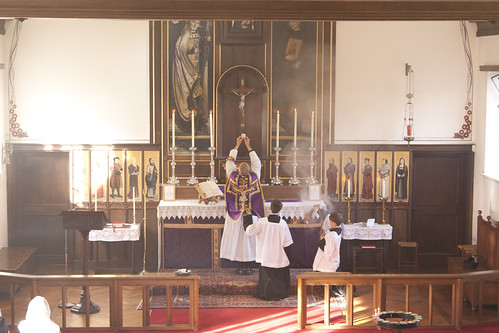 |
| Mass of reparation in Oxford: Votive Mass pro remissione peccatorum |
'Look not upon me', says the Beloved, the Church. 'For the sun hath looked upon me.' Labouring in the vineyard has darkened her skin; she is conscious that her beauty is hidden. She says: 'I am black but beautiful'. (Song of Songs, 1:5, 4)
Christ also, the spotless Lamb, was disfigured, by his enemies. Isaiah says of Him in prophecy: 'there is no beauty in him, nor comeliness: and we have seen him, and there was no sightliness, that we should be desirous of him' (Is 53:2). But again, Christ's beauty is hidden, rather than lost.
What has happened to the Church in the last 50 years and more is a disfigurement, a disgrace. Like the Beloved of the Song of Songs, the Church has been cast out of doors without her veil:
'The watchmen that went about the city found me, they smote me, they wounded me; the keepers of the walls took away my veil from me.' (Song 5:7)
The defilement of the Church is real in one sense, and only apparent in another. As a human institution she can be wounded and shamed. As a divine institution she cannot. She is both human and divine, a mirror of Christ, who in His humanity truly suffered and died. This suffering was not unreal or superficial: the betrayal, the stripping naked, the being spat upon, the being tortured and killed. It is profoundly real and of the greatest significance. And yet Christ in his Divine nature, and the Church as the Mystical Body and Bride of Christ, is not defiled: such a thing is impossible. She remains beautiful, though blackened.
This paradox is the consequence of the Incarnation, and the way the Incarnation is continued in the Church as the Mystical Body of Christ. Something with a physical, personal, human manifestation in the world is susceptible to attack, wounding, and disgrace. You can't have an incarnational theology without this consequence.
One might object that, in the case of the Church, the most important wounds are self-inflicted. However, it is not the Mystical Body as such which causes the wounds; it is her human members when they fail to act as members. When we engage in the Public Prayer of the Church we act as one with the Mystical Body and offer to God a perfect act of Worship which only the Mystical Body of Christ, that is, only Christ Himself, can offer. When we (bishops, priests, laymen) perform sacramental actions, it is the action of Christ through his Mystical Body. When we commit some hideous sacrilege it is not. It is a wound we give to the Mystical Body, against the Mystical Body.
The Mystical Body is not a pure, spiritual thing which can only be seen with the eyes of Faith. It has a real, human, historical, manifestation. This manifestation can make it as vulnerable to profanation as the manifestation of the Body of Christ in the Blessed Sacrament. But while those who profane the Blessed Sacrament do something serious, because Christ is truly present there, they do not harm Christ. At the Last Judgement, when wicked Catholics, including priests, bishops, and popes, are tossed into Hell, the Church, as the Bride of Christ, will be presented to her Lord as a spotless virgin (2 Corinthians 11:2).
The relationship between Christ's Divine and Human natures is, notoriously, not easy to explain: it is a mystery. That is, we can understand a number of things about it, things we must say and things we must deny about it, but we cannot fully grasp its internal logic. The same is true of the relationship between the human and divine aspects of the Church. I must leave it as something of a paradox. But it is paradox we must believe.
What we believe about the Church has the consequence that we are right to be angry, as well as bitterly grieved, about the clerical abuse revelations. This anger is not simply a justified emotional reaction, it is a duty. Anger is a desire for justice, and we must do what we can to secure justice in this case. This may well mean being less polite than we were wont to be, less inclined to overlook things, less generous with our money and volunteering: in a careful, systematic, persistent, and thought-through way.
What is not right would be to take the occasion to doubt the Church's divine institution. The good works of the Church's members, it is true, might be a consideration in her favour, and evil works obviously count the other way. However, the Church's divine nature is manifested above all in the liturgy, the sacraments, and the perennial teaching which is guided by the Holy Spirit. My Catholic readers know what I mean when I say that as Catholics we know this deep down. We have experienced the consolation of the liturgy. We have experienced Christ's forgiveness in confession. We know that the Real Presence is not make-believe: it is a supernatural fact that impinges insistently on the material world, in our lives, and in the lives of others. We cannot let the defilement of the Mystical Body lead us to doubt the purity of the Mystical Body, odd as that might seem. The Satanist who defiles the Blessed Sacrament does not make it less holy. His actions are, in fact, a testimony to that holiness, which he recognises and hates.
Satanists hate holy things because they have turned away from God and are enraged by the concrete possibility of goodness which they have rejected. They wish to tear it down to their own level of filthiness. It is said that paedophiles feel similarly about the innocence of children. Today's focus is on the bishop-enablers. What were they thinking? Certainly they were not motivated by reverence and love for what is holy and for the innocent. The crushing worldliness of the episcopal attitude, the managerialism, is striking, but it does not explain actions which were often irrational and self-defeating from a worldly point of view. Those who see something demonic here are correct. What we see is a brutal carelessness, of brushing things aside, which reflects a rejection of the categories of holiness and innocence. They may have thought they believed the Faith, some of them, but at some level they did not. Not just in moments of high emotion, not just under intense temptation, but calmly, deliberately, day after day, year after year, in case after case, they rejected celibacy, they rejected the holiness of the sacraments, and they crushed innocence in the mortar.
Catholic activists have seen this before. Those concerned with pro-life issues, liturgical abuses, Catholic education, or the Traditional liturgy, all have had experiences over 50 years exactly parallel with the experiences of the victims and parents of victims of clerical abuse. Buck-passing, contempt for faithful Catholics, appeals to clerical and episcopal dignity and authority, the toleration and imposition of injustices, and outright lies. Such Catholics were the only audience for the early denunciations of clerical abuse, when the secular media weren't listening. They read Michael Rose's Goodbye Good Men, which was published in 2002, while liberal and neo-conservative Catholics choked with rage that bishops and priests could be criticised. What Rose described, the anti-celibate and specifically homosexual culture of seminaries, was made possible by a culture of aggressive destruction of the holy, of devotions and buildings and doctrine and pious practices, and of the people who defended them, which these activist Catholics had read about in Ann Carey's Sisters in Crisis in 1997, and all the books and pamphlets of Michael Davies, Dietrich von Hildebrand, Anne Roche Muggeridge, Fr Bryan Houghton, and many others in the 1980s and 1970s. Such Catholics were the only audience for discussions of the prophecies of Our Lady of Salette, of Akita, of Quito, and of Fatima, which pointed to the culmination of modernism and secularism within the Church in a massive crisis of apostasy and sacrilege in the later part of the 20th century. Well, all that stuff doesn't look so stupid now, does it?
This is a crisis fundamentally of the Faith. Outside the Church and inside, those who permit and even promote this kind of abuse from positions of authority are those who hate the Faith. They may like lace and watered silk: most do not, but some do. But they all hate the Faith where it impinges on their desires, they hate those people and things which represent to them the possibility of repentance, and they want bring down to their own level of sordid carelessness the innocent.
What we need are, simply, bishops who do not have this hatred, and have the courage to confront and uproot it. All kinds of pressure and strategies are worth exploring, but some devils can only be cast our by prayer and fasting. As well as the practical things, we have a duty to make reparation.
There is still time to sign up to the Walsingham Pilgrimage. But whatever you do, join me in doing something in reparation for this abyss of filth which has been revealed. God will hear us.
Support the work of the LMS by becoming an 'Anniversary Supporter'.
Appeal to the Cardinals over the Death Penalty
An unprecedented appeal to the College of Cardinals
In an unprecedented move, 45 Catholic academics and clergy have signed an Appeal to the Cardinals of the Catholic Church, urging the cardinals to tell Pope Francis that he must teach the authentic Catholic doctrine concerning capital punishment. The appeal follows an addition to the Church’s Catechism announced by Pope Francis on August 2nd. The new paragraph, which is confusingly worded, has been taken by many inside and outside the Church to say that capital punishment is intrinsically immoral, and must never be used. Such a teaching would run contrary to many passages in the Bible, and to the teaching of the Church down the centuries.
Catholics hold that while a pope has the right to clarify matters of faith and morals, he has no right to introduce new doctrines, or to contradict what the Church has always believed. They likewise hold that a pope must not seek to impose his private opinions on the faithful. The petition, which has been signed by professors of philosophy, theology, law, and history from Catholic institutions across the world, and by priests from several countries, calls on the cardinals to advise the pope that he must withdraw the offending paragraph, and that he must not ‘adulterate the word of God’. It also advises the cardinals that they have a serious obligation to warn the pope in this way, in order not to fail in their own duty toward God and the Church.
The petition does not insist that capital punishment must always be used in practice for the worst crimes, since this is a matter which Catholic may freely debate. It insists on the legitimacy of the death penalty in principle.
According to the Church’s own law, competent Catholics “have the right and even at times the duty to manifest […] their opinion on matters which pertain to the good of the Church and to make their opinion known to the rest of the Christian faithful” (Code of Canon Law, Canon 212). St Thomas Aquinas, considered a model for Catholic theologians, likewise held that: “If the faith were endangered, a subject ought to rebuke his prelate even publicly.”
The petition has been sent to the cardinals, because they are traditionally considered to be the pope’s own counsellors. There are currently 224 cardinals in the world.
For further information, contact Dr Joseph Shaw:
joseph.shaw99@gmail.com
A note on babies in church, from 1921
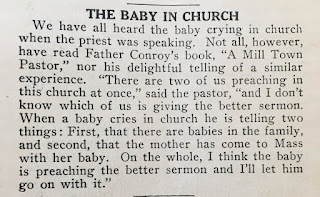 Every now and then the issue of babies crying in Mass comes up, and I thought this note from the early 20th century is worth preserving on this blog. The book from which this anecdote comes was published in 1921 (it is available as a reprint interestingly).
Every now and then the issue of babies crying in Mass comes up, and I thought this note from the early 20th century is worth preserving on this blog. The book from which this anecdote comes was published in 1921 (it is available as a reprint interestingly).
Hat-tip to @AudreyFaithSeah on Twitter, who tells us
Timeless wisdom on preaching for hearing people (from a 1924 issue of “the Catholic Deaf-mute” newspaper).
I've written about children and babies in church here (on Geoffrey Hull claiming that babies should not be there at all), here (on 'crying rooms'), and here (FIUV Position Paper on children and the Traditional Mass).
I don't think (and I don't think Fr Conroy really thinks) that we should prefer listening to a baby crying in church than to the sermon; the point is rather that the occasional noise of a baby is not something out of place, in a church, nor should it be a matter of regret, let alone frustration and rage. Parents should, obviously, do their best to keep their children quiet, and everyone else should do their best to make them feel welcomed and supported. This last point, sadly, needs making more emphatically than should be necessary.
Occasionally people claim that crying babies is a new thing in churches, but as far as anecdotal evidence goes Fr Bryan Houghton expected to see small children in church in England in the 1950s and 1960s (see the first link above), and people clearly expected to see them in church in the USA in the first decades of the 20th century. As I have pointed out in the linked post on Geoffrey Hull, what else are you supposed to do with your infants when you go to church?
Our Lord of course defended the participation of children in the quasi-liturgical event of his entry into Jerusalem, a participation recalled beautifully in the chant Pueri Hebraeorum used on Palm Sunday. Matthew 21:15-16: ‘And the chief priests and scribes, seeing the wonderful things that he did, and the children crying in the temple, and saying: Hosanna to the son of David; were moved with indignation. And said to him: Hearest thou what these say? And Jesus said to them: Yea, have you never read: Out of the mouth of infants and of sucklings thou hast perfected praise?’
The kings, judges, and prophets of the Old Testament go one better, and actually command children to be present at liturgical events:
Deuteronomy 31:12 (at the command of Moses): ‘And the people being all assembled together, both men and women, children and strangers, that are within thy gates: that hearing they may learn, and fear the Lord your God, and keep, and fulfill all the words of this law.’ Cf. Joshua 8:35 (at the command of Joshua), and 2 Kings 23:1-2 (at the command of King Josiah).
10 Joel 2:15-7: ‘Blow the trumpet in Sion, sanctify a fast, call a solemn assembly. Gather together the people, sanctify the church, assemble the ancients, gather together the little ones, and them that suck at the breasts:let the bridegroom go forth from his bed, and the bride out of her bridal chamber. Between the porch and the altar the priests, the Lord’s ministers, shall weep, and shall say: Spare, O Lord, spare thy people: and give not thy inheritance to reproach, that the heathens should rule over them.’
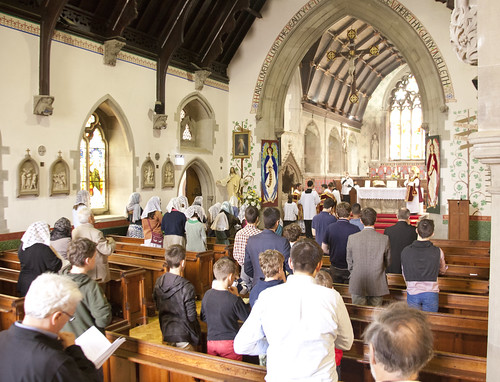 |
| Children at the St Catherine's Trust Summer School 2017 |
Support the work of the LMS by becoming an 'Anniversary Supporter'.
Come to Walsingham with Latin Mass Society!
The LMS walking pilgrimage from Ely to Walsingham is taking place this month: we gather on the evening of Thursday 23rd August, and get to Walsingham on Sunday 26th August.
We need volunteers as usual. If you have catering experience and would like to be a cook,
or have a private car / MPV / Landrover or the like and would like to drive a support vehicle,
email info@lms.org.uk with 'Walsingham Volunteers' in the subject line. These are non-walking roles, and there is no pilgrim's registration fee if you take part in these ways.
Support the work of the LMS by becoming an 'Anniversary Supporter'.
Venerating a relic of the Cure of Ars
Support the work of the LMS by becoming an 'Anniversary Supporter'.
Successful Latin Course from the LMS
Last week the Latin Mass Society's residential Latin Course took place. We were close to capacity in the venue, the Carmelite Retreat Centre at Boars Hill near Oxford. With the help of Matthew Schellhorn and a number of singers who were present as students Sung Mass was celebrated each day and Compline twice. The two priests who attended as students took turns with Fr John Hunwicke, who was teaching, to celebrate the Sung Masses, as well as Low Masses before breakfast.
The course is intensive, and the participants worked hard. But it was clearly also a lot of fun.
In addition to Fr Hunwicke, we had as a tutor this year Jean van der Stegen (top photo).
The dates for next year are already booked at the same venue: Monday 29th July 2019 to Friday 2nd August. Booking will open as soon as we've worked out the pricing.
Support the work of the LMS by becoming an 'Anniversary Supporter'.
The death penalty for the prestige of the Papacy
I was asked for a quote by a journalist when the story broke; it was used by LifeSite here. I paste my full statement below.
'Catechisms are not usually regarded as magisterial documents in their own right, but as systematic summaries of magisterial documents. Their value lies in their accuracy as reflections of the Church’s perennial teaching. With this change by Pope Francis, the Catechism of the Catholic Church has become less accurate than it was before, since it is clear from both the teaching and the practice of the Church over two millennia, and the clear and consistent message of Scripture, that capital punishment is not incompatible with the dignity of the criminal, nor with his redemption.
‘The text recently published also appeals to contingent historical circumstances, such as the modern penal system. Such considerations, which apply in any case to some countries more than to others, are irrelevant to the question of whether capital punishment is always and everywhere wrong.
‘This development brings to a head the troubling question of whether the Holy Father’s theological advisers see themselves as bound by the definitive statements of past popes, including the well-known account of capital punishment given by Pope Pius XII. If they are not bound by past popes, there is no reason why future popes should be bound by this statement, and indeed the authority of Pope Francis over Catholics today is called into question.’
(See also my post about the death penalty here.)
The people online and in the media saying 'Well I've never liked capital punishment so I'm fine with this' are like the people who say, when there's a military coup and the rule of law is suspended and people are rounded up for imprisonment without trial, 'Well I never liked those people so I'm fine with this'. They are conceding something of permanent, strategic significance for something of transitory, tactical significance. They are selling their birthright for a mess of pottage.
Maybe they think that the wrongness of the Death Penalty is of fundamental significance, but even so it should be obvious that this way of winning the argument is not only self-defeating but is destructive of any possible future use of the prestige of the Papacy to win any argument inside or indeed outside the Church about anything. If Pope Francis openly contradicts Pope Pius XII, the Congregation for the Doctrine of the Faith as recently as 2004, Scripture, the Fathers of the Church, and the entire Tradition, then the statement of a Pope, given a permanent place in the documents of the Church both in a speech recorded in L'Osservatore Romano and in the Catechism of the Catholic Church, ceases to have serious weight. Catholics and non-Catholics alike will cease to assume that such a statement is an authoritative emanation from an age-old tradition with normative force for the world's Catholics. It may as well be described as a passing, personal, political, foible. That is what I mean by the loss of the Papacy's prestige.
But wait! some will say: Aren't you going to see if the statement really is in contradiction with the immemorial teaching of the Church? No, that is neither necessary nor possible. Allow me to explain. Here is the money-quote of the new statement:
Consequently, the Church teaches, in the light of the Gospel, that “the death penalty is inadmissible because it is an attack on the inviolability and dignity of the person”
The previous version of the Catechism told us:
the traditional teaching of the Church does not exclude recourse to the death penaltySince the new wording is not a simple grammatical contradiction of the old wording (as 'the traditional teaching of the Church excludes recourse to the death penalty' would be), then those so inclined may seek to interpret the new statement in some way which is not strictly incompatible with the old. So we have people saying things like this: what the new wording means is that in modern conditions the death penalty can never be used, and not that it is, like murder, per se malum ('evil in itself').
This is not the natural reading of the text, but one might argue that since it is purporting to represent the teaching of the Church we must read it if humanly possible in accord with previous authoritative statements of that teaching. On the other hand, bishops and theologians supposedly friendly to Pope Francis are loudly saying that the natural reading is the correct one: what modern conditions reveal is simply that the death penalty is never licit, never morally possible, because it contradicts human dignity.
We've been here before, have we not? This is the well-worn strategy of Amoris laetitia, and indeed of a lot of things since the Second Vatican Council. Flat contradictions with previous statements are avoided in official documents, but trumpeted by theologians and applied in practice by bishops, who are seldom corrected. This is no accidental ambiguity: it is a design feature. In this case the mouse-hole of ambiguity conservative Catholics need to crawl through to maintain the continuity between the two editions of the Catechism is humiliatingly small. When they have crawled through it, moreover, they will be ignored.
The argument about whether the new statement can be read in continuity with the old is, therefore, not something which can be settled: the ambiguity is inherent to the statement. What is clear is that this statement has been given the form of an official teaching of the Church, rather than just a prudential judgment, and that the purpose and effect of its promulgation is the undermining of belief in the binding and irreformable teaching of the Church that the death penalty is licit in some circumstances.
It is not necessary to settle the question of the precise meaning of the new statement, because whether it is read in a natural way or as being ambiguous makes no difference: in either case, Catholics must accept the constant teaching of the Church, the teaching well expressed in many documents of the Church over the centuries, not very well expressed in the old Catechism wording, and not expressed at all in the new wording.
In the meantime, as I have said, it is the prestige of the Papacy which is undermined. Whereas papal statements once had weight even outside the Church because they visibly expressed an ancient tradition, and could remind us all of truths which modernity was eager to forget, this is clearly no longer necessarily the case. Once we have digested this statement, there is nothing which the Pope will not be able to say to overturn other teachings, a corollary which those who reject other teachings of the Church have already pointed out. If the Papacy's prestige is totally destroyed, of course, it will not even be necessary for a pope to contradict statements made by his predecessors, because those statements will already have lost their force.
So that's fine and dandy, isn't it? If the power of the teaching of the Church is undermined, those things which that teaching have, however feebly, been holding back, such as theft, say, will be left unrestrained. It hardly matters that future liberal popes will not be taken very seriously when they say that theft is licit in certain subjective circumstances, if the old statements saying that it is never licit have themselves lost their power. If, as I have pointed out, liberalism is above all a negative, destructive, doctrine, then this is a win for liberalism. The things liberalism wants to destroy will be effectively undermined, and the positive, constructive project of conservatism will be crippled.
I think a lot of political strategy works by a kind of instinct, by habits of mind and associations of ideas. So I don't think this is necessarily the conscious plan of Pope Francis or anyone around him. What is clear is that he is not worried by the issue of visible continuity of teaching in the way almost all of his predecessors were. He's not worried about it because he's not worried about the consequences of obscuring this continuity, consequences those predecessors regarded as disastrous. He regards those consequences either as indifferent or positive.
This way of looking at things makes it harder for me to respond to the sincere and bewildered question: does all this mean that the Pope is a heretic, or even that his has lost his office? It is harder because I am not attributing to him clear-cut heretical intentions or indeed statements. But two things are clear. The first is that we have to continue to believe the teaching of the Church as authoritatively expressed down the ages. The second is that we have to continue to regard Jorge Mario Bergoglio as Pope for practical purposes unless and until some consensus or assembly of those with hierarchical authority in the Church declares that he has in some way 'deposed himself', in accordance with various theological theories on the subject. And no, that hasn't happened and is extremely unlikely to happen.
The confusion of this papacy cannot be wished away. Our task is to hold fast to the truth.
Support the work of the LMS by becoming an 'Anniversary Supporter'.

